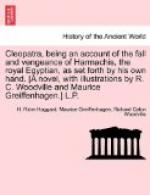On the fourth day some priests of Annu came to lead me to Sepa, my uncle, the High Priest of Annu. So, having bidden farewell to those of Memphis, we crossed the river and rode on asses two parts of a day’s journey through many villages, which we found in great poverty because of the oppression of the tax-gatherers. Also, as we went, I saw for the first time the great pyramids that are beyond the image of the God Horemkhu, that Sphinx whom the Greeks name Harmachis, and the Temples of the Divine Mother Isis, Queen of the Memnonia, and the God Osiris, Lord of Rosatou, of which temples, together with the Temple of the worship of the Divine Menkau-ra, I, Harmachis, am by right Divine the Hereditary High Priest. I saw them and marvelled at their greatness and the white carven limestone, and red granite of Syene, that flashed the sun’s rays back to heaven. But at this time I knew nothing of the treasure that was hid in Her, which is the third among the pyramids—would I had never known of it!
And so at last we came within sight of Annu, which after Memphis has been seen is no large town, but stands on raised ground, before which are lakes fed by a canal. Behind the town is the inclosed field of the Temple of the God Ra.
We dismounted at the pylon, and were met beneath the portico by a man not great of stature, but of noble aspect, having his head shaven, and with dark eyes that twinkled like the further stars.
“Hold!” he cried, in a great voice which fitted his weak body but ill. “Hold! I am Sepa, who opens the mouth of the Gods!”
“And I,” I said, “am Harmachis, son of Amenemhat, Hereditary High Priest and Ruler of the Holy City Abouthis; and I bear letters to thee, O Sepa!”
“Enter,” he said. “Enter!” scanning me all the while with his twinkling eyes. “Enter, my son!” And he took me and led me to a chamber in the inner hall, closed to the door, and then, having glanced at the letters that I brought, of a sudden he fell upon my neck and embraced me.
“Welcome,” he cried, “welcome, son of my own sister, and hope of Khem! Not in vain have I prayed the Gods that I might live to look upon thy face and impart to thee the wisdom which perchance I alone have mastered of those who are left alive in Egypt. There are few whom it is lawful that I should teach. But thine is the great destiny, and thine shall be the ears to hear the lessons of the Gods.”
And he embraced me once more and bade me go bathe and eat, saying that on the morrow he would speak with me further.
This of a truth he did, and at such length that I will forbear to set down all he said both then and afterwards, for if I did so there would be no papyrus left in Egypt when the task was ended. Therefore, having much to tell and but little time to tell it, I will pass over the events of the years that followed.




